The AMD Ryzen Threadripper 3960X and 3970X Review: 24 and 32 Cores on 7nm
by Dr. Ian Cutress, Andrei Frumusanu & Gavin Bonshor on November 25, 2019 9:05 AM ESTCPU Performance: Encoding Tests
With the rise of streaming, vlogs, and video content as a whole, encoding and transcoding tests are becoming ever more important. Not only are more home users and gamers needing to convert video files into something more manageable, for streaming or archival purposes, but the servers that manage the output also manage around data and log files with compression and decompression. Our encoding tasks are focused around these important scenarios, with input from the community for the best implementation of real-world testing.
All of our benchmark results can also be found in our benchmark engine, Bench.
Handbrake 1.1.0: Streaming and Archival Video Transcoding
A popular open source tool, Handbrake is the anything-to-anything video conversion software that a number of people use as a reference point. The danger is always on version numbers and optimization, for example the latest versions of the software can take advantage of AVX-512 and OpenCL to accelerate certain types of transcoding and algorithms. The version we use here is a pure CPU play, with common transcoding variations.
We have split Handbrake up into several tests, using a Logitech C920 1080p60 native webcam recording (essentially a streamer recording), and convert them into two types of streaming formats and one for archival. The output settings used are:
- 720p60 at 6000 kbps constant bit rate, fast setting, high profile
- 1080p60 at 3500 kbps constant bit rate, faster setting, main profile
- 1080p60 HEVC at 3500 kbps variable bit rate, fast setting, main profile
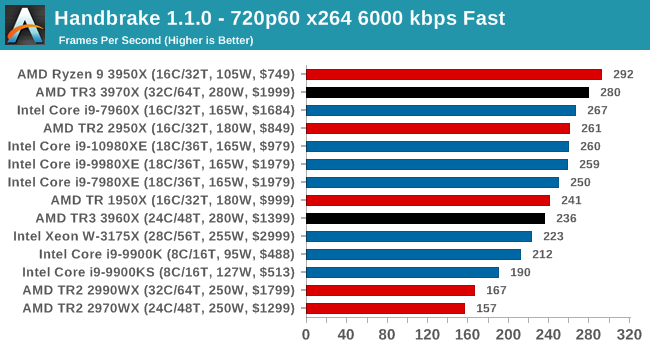
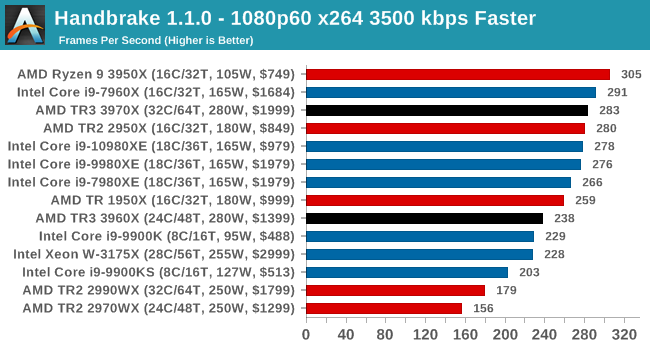
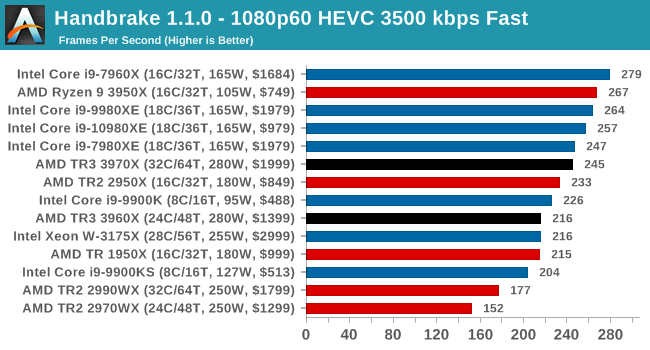
Video encoding is a little varied, based on the variable threaded nature. Certain encoding tests can be more memory sensitive here, or accelerated in different ways, or not scale well with more cores. Either way, TR3 performs a lot better than TR2, but the 3950X seems the best choice.
7-zip v1805: Popular Open-Source Encoding Engine
Out of our compression/decompression tool tests, 7-zip is the most requested and comes with a built-in benchmark. For our test suite, we’ve pulled the latest version of the software and we run the benchmark from the command line, reporting the compression, decompression, and a combined score.
It is noted in this benchmark that the latest multi-die processors have very bi-modal performance between compression and decompression, performing well in one and badly in the other. There are also discussions around how the Windows Scheduler is implementing every thread. As we get more results, it will be interesting to see how this plays out.
Please note, if you plan to share out the Compression graph, please include the Decompression one. Otherwise you’re only presenting half a picture.
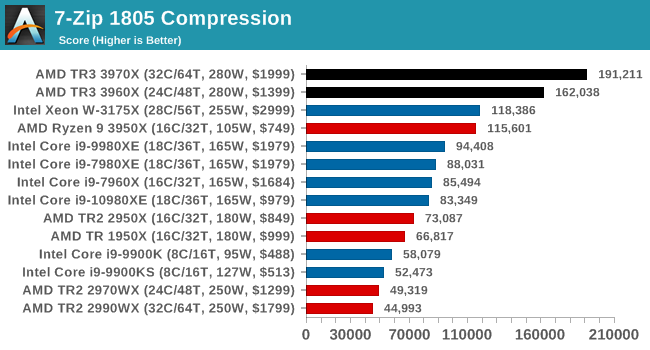
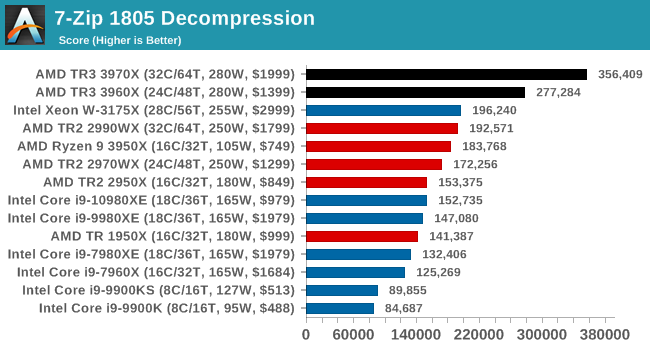
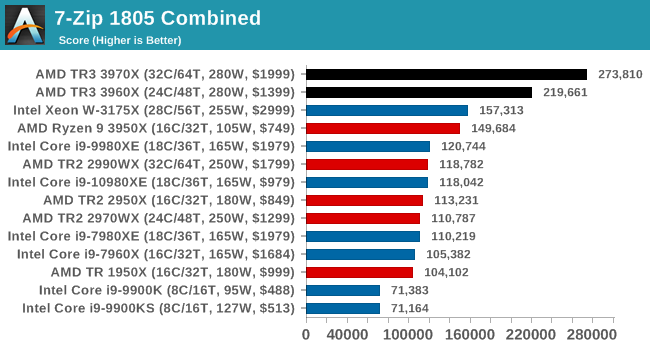
Easily parallel puts the TR3 well ahead of TR2 and Intel.
WinRAR 5.60b3: Archiving Tool
My compression tool of choice is often WinRAR, having been one of the first tools a number of my generation used over two decades ago. The interface has not changed much, although the integration with Windows right click commands is always a plus. It has no in-built test, so we run a compression over a set directory containing over thirty 60-second video files and 2000 small web-based files at a normal compression rate.
WinRAR is variable threaded but also susceptible to caching, so in our test we run it 10 times and take the average of the last five, leaving the test purely for raw CPU compute performance.
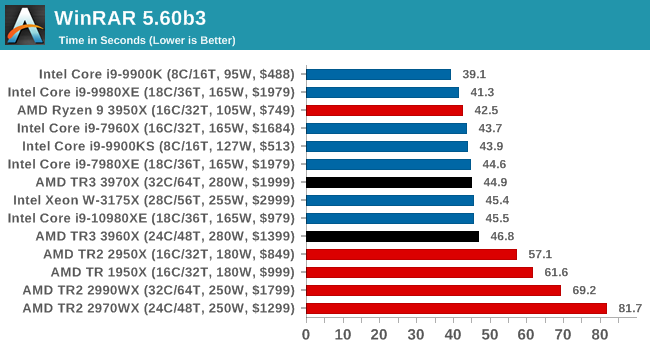
WinRAR is a variably threaded application, and both TR3 processors perform in the same ballpark as anything from Intel. Ideally we should have seen them streak ahead, but we seem to be at a point where CPU frequency or core counts are the limiting factor. At least with Zen 2, there are no issues as there was with Zen 1/Zen+.
AES Encryption: File Security
A number of platforms, particularly mobile devices, are now offering encryption by default with file systems in order to protect the contents. Windows based devices have these options as well, often applied by BitLocker or third-party software. In our AES encryption test, we used the discontinued TrueCrypt for its built-in benchmark, which tests several encryption algorithms directly in memory.
The data we take for this test is the combined AES encrypt/decrypt performance, measured in gigabytes per second. The software does use AES commands for processors that offer hardware selection, however not AVX-512.
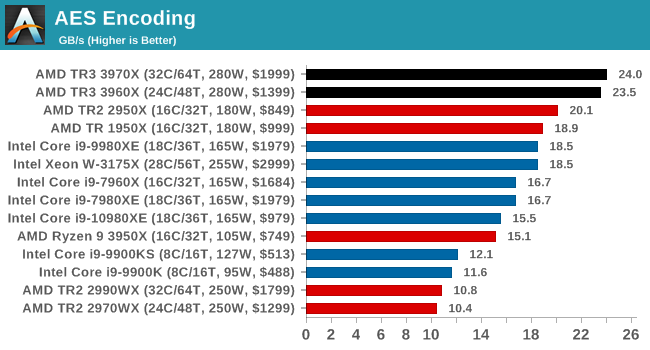










245 Comments
View All Comments
mazz7 - Monday, November 25, 2019 - link
I really thought that Anandtech viewers are smarter than others, but then i see the comments, I am really wrong about that ;pmartixy - Monday, November 25, 2019 - link
The amount of happy this makes me...Also, I'm glad to see y-cruncher in the test suite. It's been my goto power virus/perf benchmark since around the 0.5 versions.
boltcranck - Tuesday, November 26, 2019 - link
World of Tanks enCore is outdated, you should benchmark with the WoT enCoreRTwolfesteinabhi - Tuesday, November 26, 2019 - link
there us a cositant typo at several places .... 3960X is typed as 3950XTorrijos - Tuesday, November 26, 2019 - link
It would be interesting to present all the benchmarks in 2 graphs... The raw results, and then Bench/$.In order to have an idea of the financial benefits.
CraigIsSatoshiBsvIsBitcoin - Tuesday, November 26, 2019 - link
Looking forward to picking up a 64 core CPU for $200 in a couple of years..peevee - Tuesday, November 26, 2019 - link
Don't hold you breath. Well, maybe 64 in-order RISC cores. Not the same at all.liquid_c - Tuesday, November 26, 2019 - link
Gotta love how many people praise AMD and sh*t on Intel for this but just as many seem to forget that when AMD was in Intel’s place, they overcharged *way* more than Intel did / does. As a matter of fact, the 32c/64t gen3 TR costs 200$ more than last gen’s similar offering. The second AMD felt they caught a gust of wind, they slowly started inflating prices.I’m all for competition and i would love it if both Intel and AMD had some sort of control over final pricing (in my country, the 3900x costs ~700$...) but i have this distinct feeling that if things continue at this pace, AMD will become Intel 2.0, pricing and milking wise.
Bottom line - neither of the two are truly consumer friendly but memories fade and time tells its story at a slow pace.
M O B - Tuesday, November 26, 2019 - link
AMD isn't in Intel's place, and the last time there were (2003), they didn't overcharge.As for selling a 32-core CPU for $2000 on a brand new process node that also offers ECC, PCIe 4.0, and is 100W under the closest competitor--that isn't a position Intel has been in before. Even in 2012 Intel wasn't destroying the competition so utterly in single-core, multi-core, node, and feature-set at virtually ever price point.
What Intel will sell you is a 3 year old process node for $2000 like they did for the last 2 years. Rest assured that if Intel was in AMD's shoes right now that 32-core would be $3,000 and not have ECC support.
Plus, AMD has a $750 16-core that is plenty for the enthusiast market. This is truly a workstations CPU.
Xyler94 - Tuesday, November 26, 2019 - link
And Intel gets a pass on the 28 core overclocked Xeon that is priced at almost 4K?Listen, everyone wants to pay nothing for their products. But this chip isn't exactly cheap, and AMD is giving a heck of a deal on a processor Intel can't hope to make with their current processes. Remember that AMD's 64 core behemoth of a CPU only costs 7k, while Intel charges 10K for... 28 cores.